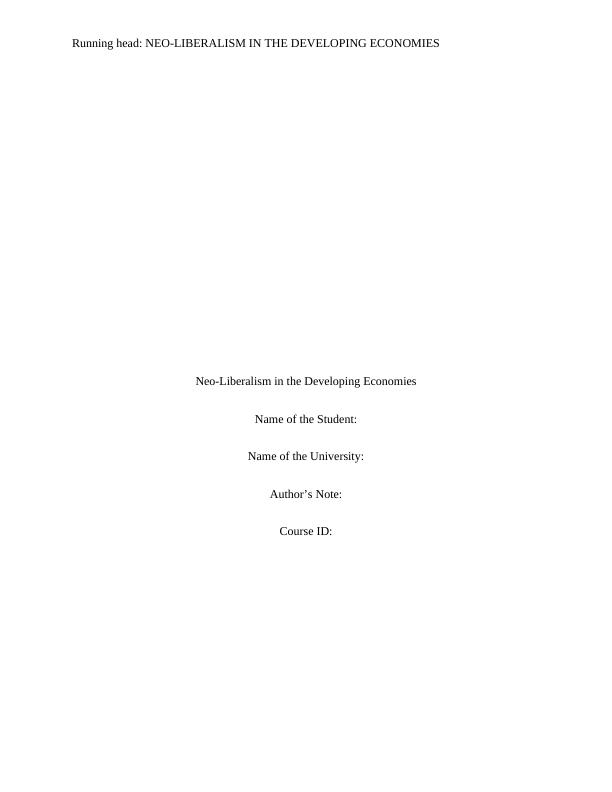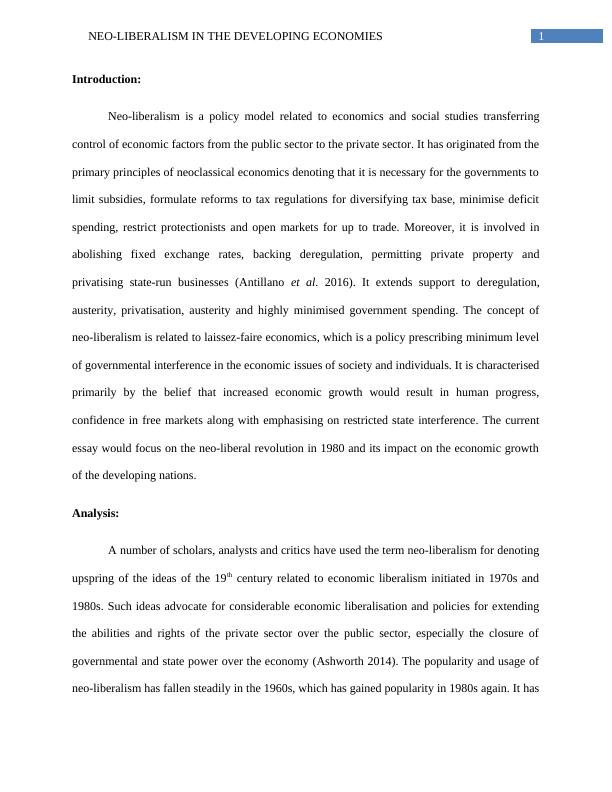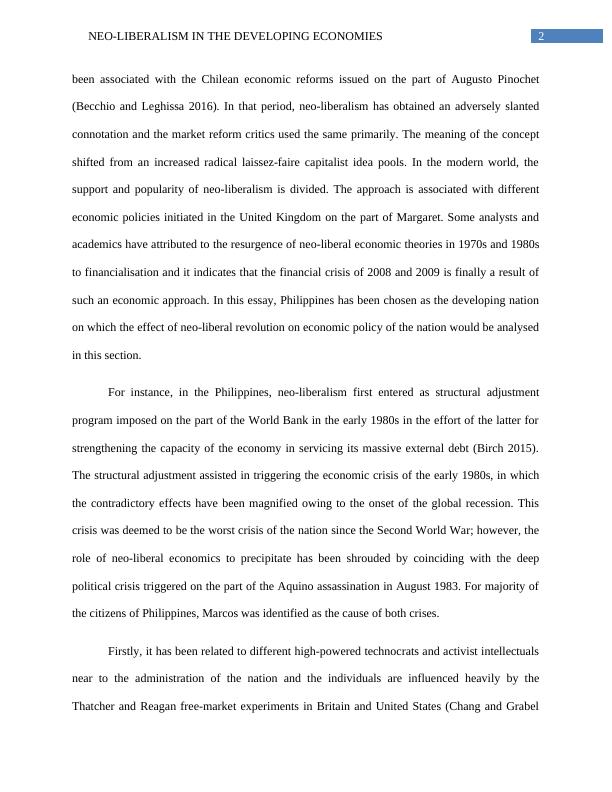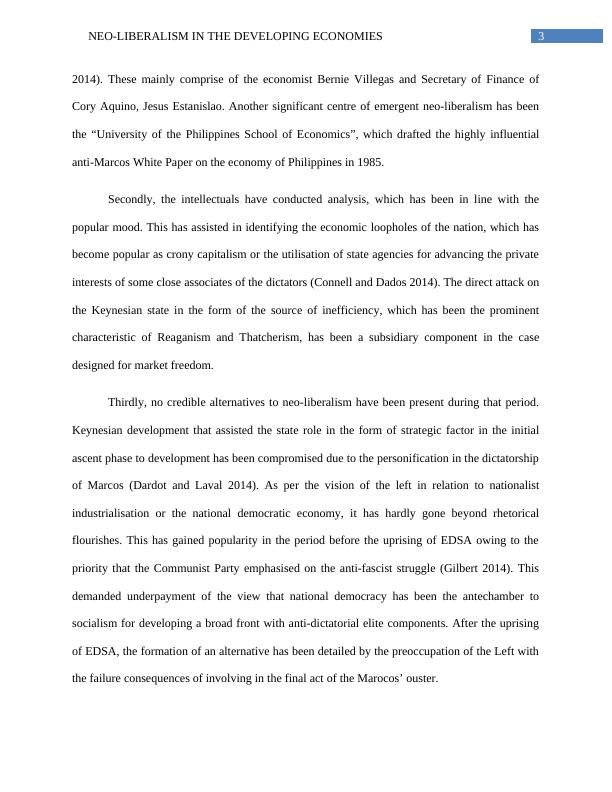Neo-Liberalism in the Developing Economies
Added on 2023-04-22
11 Pages2752 Words133 Views
Running head: NEO-LIBERALISM IN THE DEVELOPING ECONOMIES
Neo-Liberalism in the Developing Economies
Name of the Student:
Name of the University:
Author’s Note:
Course ID:
Neo-Liberalism in the Developing Economies
Name of the Student:
Name of the University:
Author’s Note:
Course ID:

1NEO-LIBERALISM IN THE DEVELOPING ECONOMIES
Introduction:
Neo-liberalism is a policy model related to economics and social studies transferring
control of economic factors from the public sector to the private sector. It has originated from the
primary principles of neoclassical economics denoting that it is necessary for the governments to
limit subsidies, formulate reforms to tax regulations for diversifying tax base, minimise deficit
spending, restrict protectionists and open markets for up to trade. Moreover, it is involved in
abolishing fixed exchange rates, backing deregulation, permitting private property and
privatising state-run businesses (Antillano et al. 2016). It extends support to deregulation,
austerity, privatisation, austerity and highly minimised government spending. The concept of
neo-liberalism is related to laissez-faire economics, which is a policy prescribing minimum level
of governmental interference in the economic issues of society and individuals. It is characterised
primarily by the belief that increased economic growth would result in human progress,
confidence in free markets along with emphasising on restricted state interference. The current
essay would focus on the neo-liberal revolution in 1980 and its impact on the economic growth
of the developing nations.
Analysis:
A number of scholars, analysts and critics have used the term neo-liberalism for denoting
upspring of the ideas of the 19th century related to economic liberalism initiated in 1970s and
1980s. Such ideas advocate for considerable economic liberalisation and policies for extending
the abilities and rights of the private sector over the public sector, especially the closure of
governmental and state power over the economy (Ashworth 2014). The popularity and usage of
neo-liberalism has fallen steadily in the 1960s, which has gained popularity in 1980s again. It has
Introduction:
Neo-liberalism is a policy model related to economics and social studies transferring
control of economic factors from the public sector to the private sector. It has originated from the
primary principles of neoclassical economics denoting that it is necessary for the governments to
limit subsidies, formulate reforms to tax regulations for diversifying tax base, minimise deficit
spending, restrict protectionists and open markets for up to trade. Moreover, it is involved in
abolishing fixed exchange rates, backing deregulation, permitting private property and
privatising state-run businesses (Antillano et al. 2016). It extends support to deregulation,
austerity, privatisation, austerity and highly minimised government spending. The concept of
neo-liberalism is related to laissez-faire economics, which is a policy prescribing minimum level
of governmental interference in the economic issues of society and individuals. It is characterised
primarily by the belief that increased economic growth would result in human progress,
confidence in free markets along with emphasising on restricted state interference. The current
essay would focus on the neo-liberal revolution in 1980 and its impact on the economic growth
of the developing nations.
Analysis:
A number of scholars, analysts and critics have used the term neo-liberalism for denoting
upspring of the ideas of the 19th century related to economic liberalism initiated in 1970s and
1980s. Such ideas advocate for considerable economic liberalisation and policies for extending
the abilities and rights of the private sector over the public sector, especially the closure of
governmental and state power over the economy (Ashworth 2014). The popularity and usage of
neo-liberalism has fallen steadily in the 1960s, which has gained popularity in 1980s again. It has

2NEO-LIBERALISM IN THE DEVELOPING ECONOMIES
been associated with the Chilean economic reforms issued on the part of Augusto Pinochet
(Becchio and Leghissa 2016). In that period, neo-liberalism has obtained an adversely slanted
connotation and the market reform critics used the same primarily. The meaning of the concept
shifted from an increased radical laissez-faire capitalist idea pools. In the modern world, the
support and popularity of neo-liberalism is divided. The approach is associated with different
economic policies initiated in the United Kingdom on the part of Margaret. Some analysts and
academics have attributed to the resurgence of neo-liberal economic theories in 1970s and 1980s
to financialisation and it indicates that the financial crisis of 2008 and 2009 is finally a result of
such an economic approach. In this essay, Philippines has been chosen as the developing nation
on which the effect of neo-liberal revolution on economic policy of the nation would be analysed
in this section.
For instance, in the Philippines, neo-liberalism first entered as structural adjustment
program imposed on the part of the World Bank in the early 1980s in the effort of the latter for
strengthening the capacity of the economy in servicing its massive external debt (Birch 2015).
The structural adjustment assisted in triggering the economic crisis of the early 1980s, in which
the contradictory effects have been magnified owing to the onset of the global recession. This
crisis was deemed to be the worst crisis of the nation since the Second World War; however, the
role of neo-liberal economics to precipitate has been shrouded by coinciding with the deep
political crisis triggered on the part of the Aquino assassination in August 1983. For majority of
the citizens of Philippines, Marcos was identified as the cause of both crises.
Firstly, it has been related to different high-powered technocrats and activist intellectuals
near to the administration of the nation and the individuals are influenced heavily by the
Thatcher and Reagan free-market experiments in Britain and United States (Chang and Grabel
been associated with the Chilean economic reforms issued on the part of Augusto Pinochet
(Becchio and Leghissa 2016). In that period, neo-liberalism has obtained an adversely slanted
connotation and the market reform critics used the same primarily. The meaning of the concept
shifted from an increased radical laissez-faire capitalist idea pools. In the modern world, the
support and popularity of neo-liberalism is divided. The approach is associated with different
economic policies initiated in the United Kingdom on the part of Margaret. Some analysts and
academics have attributed to the resurgence of neo-liberal economic theories in 1970s and 1980s
to financialisation and it indicates that the financial crisis of 2008 and 2009 is finally a result of
such an economic approach. In this essay, Philippines has been chosen as the developing nation
on which the effect of neo-liberal revolution on economic policy of the nation would be analysed
in this section.
For instance, in the Philippines, neo-liberalism first entered as structural adjustment
program imposed on the part of the World Bank in the early 1980s in the effort of the latter for
strengthening the capacity of the economy in servicing its massive external debt (Birch 2015).
The structural adjustment assisted in triggering the economic crisis of the early 1980s, in which
the contradictory effects have been magnified owing to the onset of the global recession. This
crisis was deemed to be the worst crisis of the nation since the Second World War; however, the
role of neo-liberal economics to precipitate has been shrouded by coinciding with the deep
political crisis triggered on the part of the Aquino assassination in August 1983. For majority of
the citizens of Philippines, Marcos was identified as the cause of both crises.
Firstly, it has been related to different high-powered technocrats and activist intellectuals
near to the administration of the nation and the individuals are influenced heavily by the
Thatcher and Reagan free-market experiments in Britain and United States (Chang and Grabel

3NEO-LIBERALISM IN THE DEVELOPING ECONOMIES
2014). These mainly comprise of the economist Bernie Villegas and Secretary of Finance of
Cory Aquino, Jesus Estanislao. Another significant centre of emergent neo-liberalism has been
the “University of the Philippines School of Economics”, which drafted the highly influential
anti-Marcos White Paper on the economy of Philippines in 1985.
Secondly, the intellectuals have conducted analysis, which has been in line with the
popular mood. This has assisted in identifying the economic loopholes of the nation, which has
become popular as crony capitalism or the utilisation of state agencies for advancing the private
interests of some close associates of the dictators (Connell and Dados 2014). The direct attack on
the Keynesian state in the form of the source of inefficiency, which has been the prominent
characteristic of Reaganism and Thatcherism, has been a subsidiary component in the case
designed for market freedom.
Thirdly, no credible alternatives to neo-liberalism have been present during that period.
Keynesian development that assisted the state role in the form of strategic factor in the initial
ascent phase to development has been compromised due to the personification in the dictatorship
of Marcos (Dardot and Laval 2014). As per the vision of the left in relation to nationalist
industrialisation or the national democratic economy, it has hardly gone beyond rhetorical
flourishes. This has gained popularity in the period before the uprising of EDSA owing to the
priority that the Communist Party emphasised on the anti-fascist struggle (Gilbert 2014). This
demanded underpayment of the view that national democracy has been the antechamber to
socialism for developing a broad front with anti-dictatorial elite components. After the uprising
of EDSA, the formation of an alternative has been detailed by the preoccupation of the Left with
the failure consequences of involving in the final act of the Marocos’ ouster.
2014). These mainly comprise of the economist Bernie Villegas and Secretary of Finance of
Cory Aquino, Jesus Estanislao. Another significant centre of emergent neo-liberalism has been
the “University of the Philippines School of Economics”, which drafted the highly influential
anti-Marcos White Paper on the economy of Philippines in 1985.
Secondly, the intellectuals have conducted analysis, which has been in line with the
popular mood. This has assisted in identifying the economic loopholes of the nation, which has
become popular as crony capitalism or the utilisation of state agencies for advancing the private
interests of some close associates of the dictators (Connell and Dados 2014). The direct attack on
the Keynesian state in the form of the source of inefficiency, which has been the prominent
characteristic of Reaganism and Thatcherism, has been a subsidiary component in the case
designed for market freedom.
Thirdly, no credible alternatives to neo-liberalism have been present during that period.
Keynesian development that assisted the state role in the form of strategic factor in the initial
ascent phase to development has been compromised due to the personification in the dictatorship
of Marcos (Dardot and Laval 2014). As per the vision of the left in relation to nationalist
industrialisation or the national democratic economy, it has hardly gone beyond rhetorical
flourishes. This has gained popularity in the period before the uprising of EDSA owing to the
priority that the Communist Party emphasised on the anti-fascist struggle (Gilbert 2014). This
demanded underpayment of the view that national democracy has been the antechamber to
socialism for developing a broad front with anti-dictatorial elite components. After the uprising
of EDSA, the formation of an alternative has been detailed by the preoccupation of the Left with
the failure consequences of involving in the final act of the Marocos’ ouster.

End of preview
Want to access all the pages? Upload your documents or become a member.
Related Documents
Concept of Neoliberalism and Democracylg...
|5
|1454
|83
Neoliberalism and Education - (Doc)lg...
|10
|2889
|376
Examining the effect of neo-liberalism on housing policy in UK since 1980slg...
|11
|3599
|125
Analysing the Impact of Neo-liberalism on Child Protection in Australialg...
|8
|1986
|66
Assignment on Theories of Urban Planninglg...
|7
|1389
|556
SOCIOLOGY. 3. 3. : SOCIOLOGY. SOCIOLOGY.lg...
|9
|2197
|36
